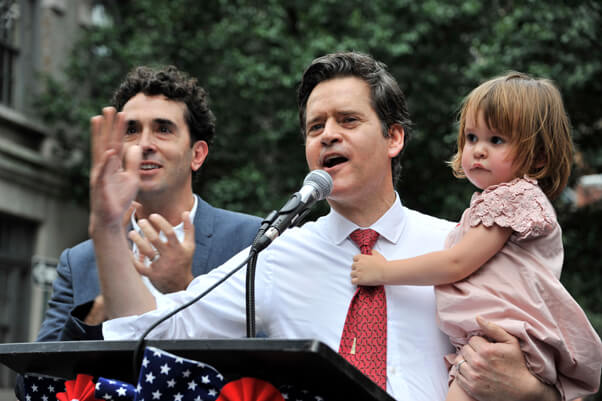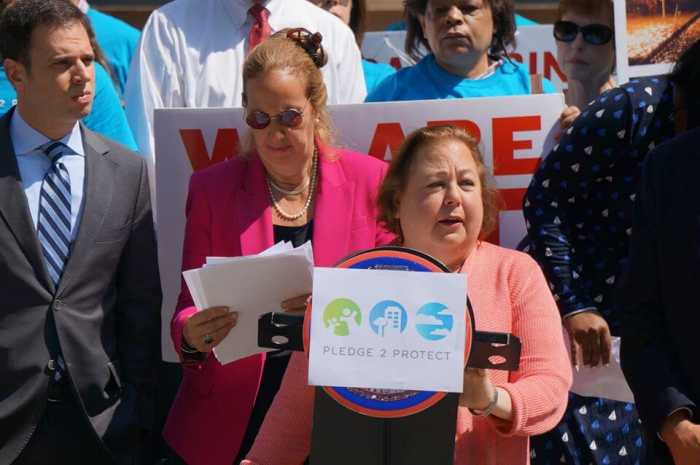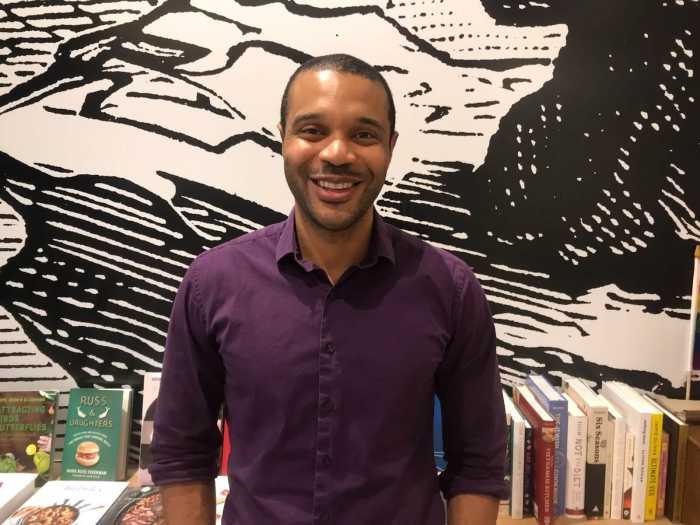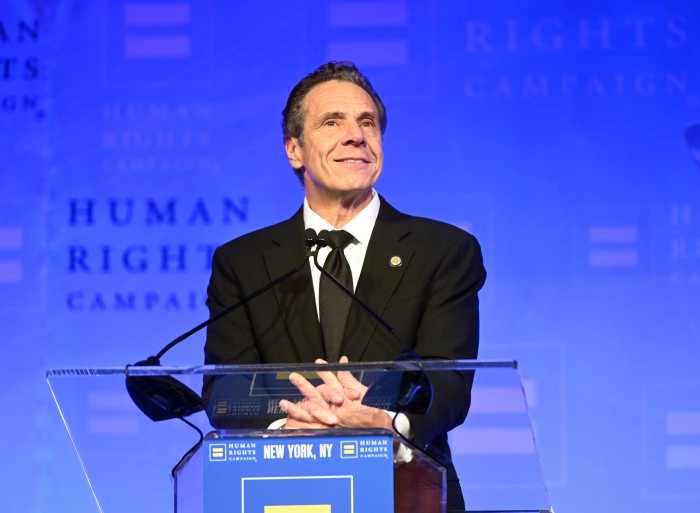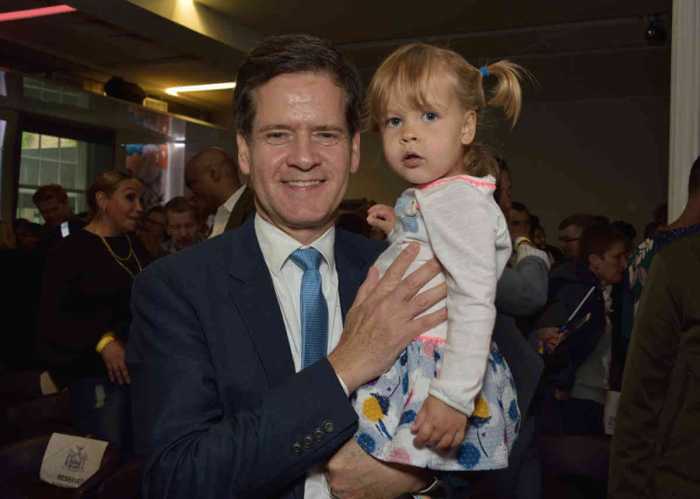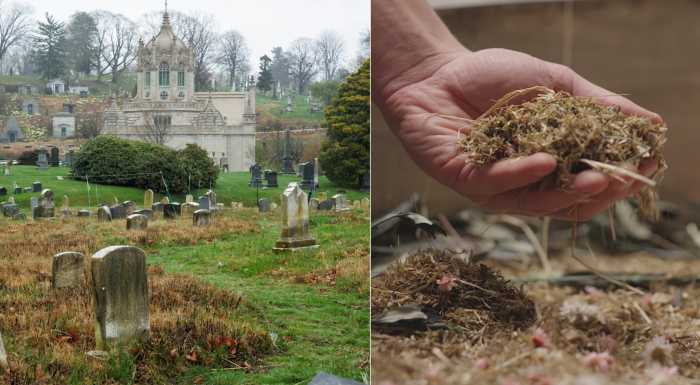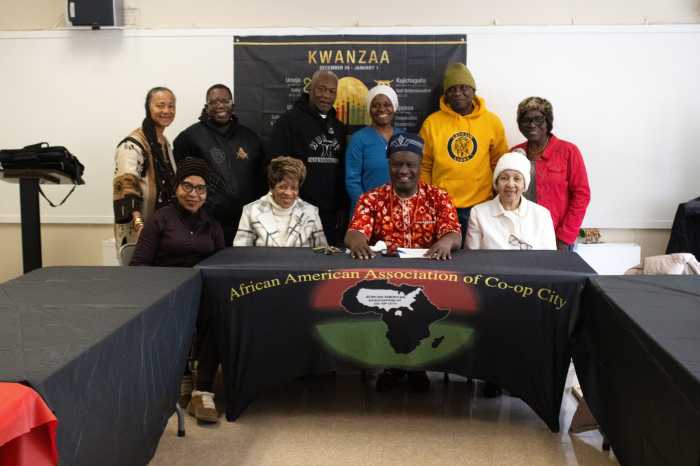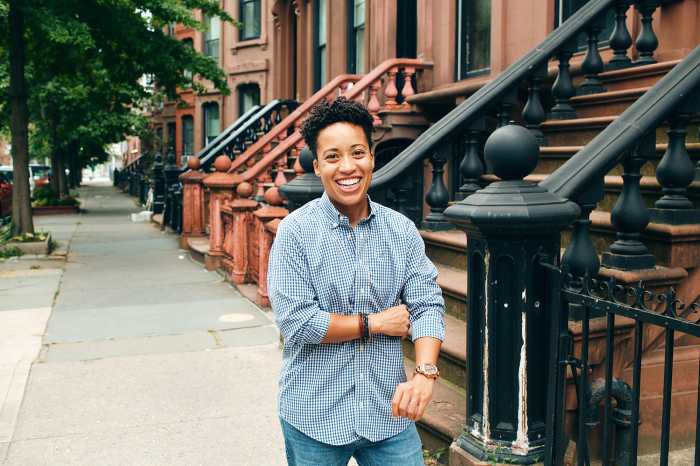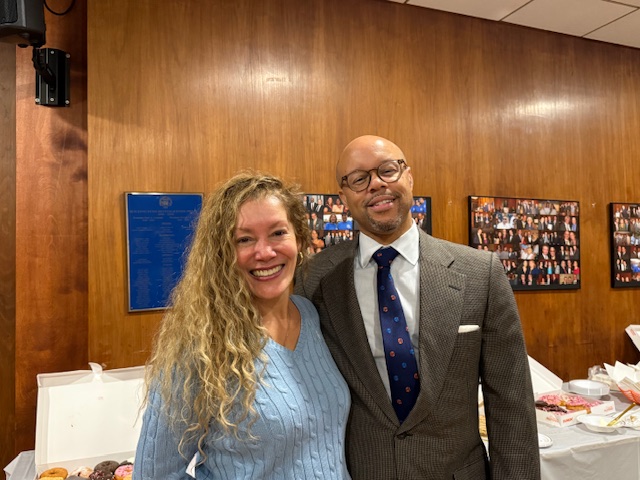State Senator Brad Hoylman (at the microphone, with his husband David Sigal and their daughter Silvia borne by a surrogate mother in California, at last June’s celebration after the Supreme Court DOMA victory. | DONA ACETO
Ruling on a previously-undecided question under New York parenting law, a Queens County Family Court judge has decided the state’s ban on surrogacy contracts poses no impediment to considering an adoption petition from the same-sex spouse of a man whose twins were conceived and borne through a gestational surrogacy contract with a woman in India.
Judge Barbara Salinitro’s April 3 ruling, in Matter of J.J., notes the failure of New York law to keep up with social change. As is often the case in family law matters involving children, all of the parties are identified solely by their initials.
The fathers in this case are identified as J.H.-W. and M.H.-W., legally married New York residents. M.H.-W. entered into a gestational surrogacy contract with Y.M.A.K. in India. M.H.-W. provided the sperm used to fertilize an anonymous donor’s egg in vitro, and Y.M.A.K. carried the twins, to whom she is not biologically related. When the twins were born on May 12, 2013, she immediately turned them over to M.H.-W., who traveled to India together with J.H.-W. for their birth.
In first New York ruling of its kind, court allows gay husband’s petition to proceed
Last May 28, the twins were granted US citizenship and permitted to enter this country. They have lived with their two fathers since then, and a home study provided to the court reported they “are thriving in their care.”
Though New York State has a controversial statutory ban on surrogacy contracts, the facts on the ground have developed away from that in significant ways. The ban dates back to the late 1980s, when the Legislature moved in response to an infamous case involving a New Jersey infant, dubbed Baby M, who was conceived under a contract between a surrogate, who herself was married, and a married couple in which the husband donated his sperm. The surrogate mother changed her mind after Baby M’s birth and fled New Jersey with her husband and the child, leading to nationwide headlines. After the child was found and returned to New Jersey, a court there held that as a matter of public policy the contract was unenforceable, even though the state had no statutory ban as New York does now. However, the court awarded primary custody to the sperm donor father, with visitation rights for the surrogate, who was both the biological and gestational mother.
In Albany, legislators moved to avoid what was seen as unseemly legal wrangling between competing would-be parents with New York’s statutory ban, making such contracts unenforceable and illegal.
Although New York’s ban remains in place, unaltered, state law has changed in other ways, including the 1995 ruling by the state’s highest bench, the Court of Appeals, approving second-parent adoptions. And, given the 2011 marriage equality law in New York, J.H.-W. is the husband of the twins’ father and so already, in essence, their step-father with whom they have been living since birth. The adoption of children by a step-father with the approval of the biological father is a routine occurrence in family courts. This is the context that faced Judge Salinitro as she considered whether twins conceived and borne through an unenforceable, illegal contract can be adopted by their biological father’s spouse.
After pointing out that surrogate parents “become parties to what New York considers an ‘illegal contract,’” she observed, “It is troublesome that when using a surrogate, a birth parent who provides his or her genetic material is a legal parent to the child, yet their partner may not be able to achieve legal parentage through adoption, even though both planned on raising that child together in a family setting. Worse yet, in cases where neither partner has furnished their genetic material for a baby carried by a surrogate, neither parent could be deemed the legal parent of a child through adoption.”
While those outcomes are “consistent with statutes dictating that no person may give or accept any type of compensation in exchange for placement of a child for the purpose of adoption,” they are, Salinitro found, “inconsistent with the Legislature’s intent that ‘each adoption should be judged upon the best interests of the child based upon a totality of the circumstances.’”
The “best interest of the child,” which is the central doctrine of family law in the United States, should overcome any doubts created by New York’s surrogacy statute, the judge ruled.
“The Court finds where a surrogacy contract exists and an adoption has been filed to establish legal parentage, such surrogacy contract does not foreclose an adoption from proceeding,” Salinitro concluded.
Whatever the court decides, she noted, the twins will live with the two men as their fathers, and the adoption petition in no way asks the court to enforce the surrogacy contract, which the surrogate willingly complied with.
Since J.H.-W. “is prepared to assume the rights and responsibilities that accompany legal parentage,” the judge wrote, “In keeping with the Legislature’s intent to encourage loving, happy families for children with parents who wish to accept that role… the Court finds that the surrogacy contract’s legality is of no consequence to the matter.”
Since the surrogacy contract is no bar to adoption, Salinitro will now proceed with the remaining formalities in the adoption proceedings. She was careful to note that her decision “should in no way be read to condone any violation of any New York State law,” but the clear tone of her opinion sounds a call to the Legislature to get moving on revising the surrogacy statute to accommodate couples unable to have children who are biologically related to at least one of them without the assistance of a surrogate.
Out gay Manhattan State Senator Brad Hoylman, who with his husband is a co-father of a girl born with the participation of a gestational surrogate in California, and Assemblywoman Amy Paulin of Westchester, both Democrats, are sponsors of legislation to allow surrogacy contracts under New York law.
J.H.-W.’s adoption petition was filed by attorney Clifford Greenberg.

